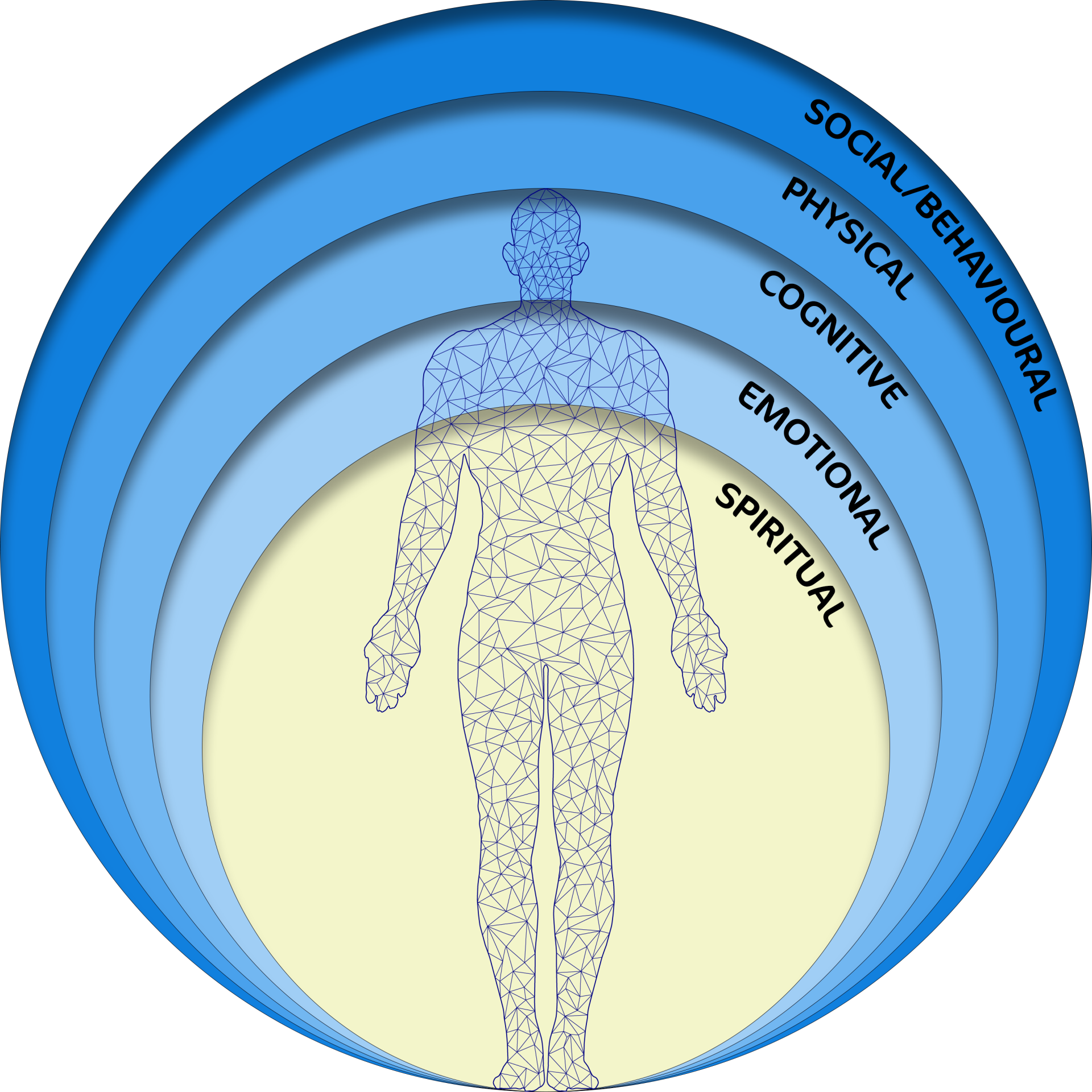Create the New You: Transform your Identity Struggles into Personal Empowerment
Discover how the FLOW Method’s unique five-level approach can equip you with tools to create your identity across physical, emotional, cognitive, social, and spiritual dimensions, leading to a stronger and more balanced sense of self.

What Are Identity Issues?
Identity issues encompass a broad range of challenges related to how you see yourself and your place in the world. These issues can deeply affect your sense of self-worth, belonging, and purpose. Common identity issues include Dissociative Identity Disorder (DID), where you might experience two or more distinct identities or personality states; Gender Identity Issues, involving a conflict between your physical gender and the gender you identify with; Identity Crisis, a period of uncertainty and confusion about your own identity; and Borderline Personality Disorder, which can include a persistent unstable self-image. Each of these conditions shares a common thread: the struggle to understand, accept, and integrate the various facets of who you are.
Effects and Risks of Unaddressed Identity Issues
Living with identity issues can profoundly impact your day-to-day life, leading to feelings of depersonalization, where you might feel detached from yourself and your surroundings, and derealization, experiencing the world around you as unreal. These symptoms can make everyday life confusing and isolating, damaging relationships and hindering your ability to function at work or school. You might find yourself constantly questioning your decisions, values, and beliefs, leading to a cycle of doubt and insecurity. If left unaddressed, the psychological turmoil of identity issues can manifest into chronic physical health problems, highlighting the deep connection between body and mind. Emotional distress might spiral into severe anxiety and depression, casting a shadow over every aspect of life. These struggles can sometimes lead to attempts to take one’s own life.
Rethinking Identity Issues
Identity issues have been pathologized in our society and culture that values conformity and normalcy and fears any instability within an individual. It’s time to rethink these identity issues as not issues at all but as individual paths people are traveling on the road to discovering and creating their identities. We are not finished products; we are all in the process of development. Instead of pathologizing this process, we can facilitate it by teaching people skills and techniques. These self-discovery and self-creation pathways are available for those who seek them, providing the tools needed to navigate the complex journey of identity formation.
How FLOW Method Helps with Identity Issues
5-Level Approach to Identity
The FLOW Method introduces a comprehensive approach by guiding you through the exploration of how five levels – physical, emotional, cognitive, social, and spiritual – collectively shape your current identity. This comprehensive view allows for a deeper understanding of how different facets of your identity interplay and contribute to your overall sense of self. By recognizing the interconnectedness of these levels, you gain a fuller understanding of yourself, providing a richer and more nuanced self-awareness.
Dealing with Past Trauma
Many of the challenges we face with our identity can be traced back to traumatic events we’ve experienced. Conditions like Dissociative Identity Disorder, for example, often develop in response to trauma encountered during childhood. Through the FLOW Method, you’re supported in a process that not only addresses these past traumas but also integrates them into your present life in a way that recognizes their role in your journey. This approach allows you to utilize these experiences as integral parts of your path to creating a new identity. By reframing these experiences and understanding their significance, the FLOW Method offers a path to healing that encompasses more than just alleviating symptoms; it helps build your identity on a foundation of resilience and understanding.
Evolving Identity – Past, Present, and Future
Identity is not static; it evolves over time. The FLOW Method assists you in recognizing and understanding how your identity has shifted across different life stages and how it continues to change. This exploration covers changes in all five levels of being, helping you appreciate the dynamic nature of your identity from your past through the present, and into the future. Acknowledging this fluidity enables you to navigate identity transitions more smoothly, seeing them as natural and integral parts of your growth.
Dealing with Dissociation
The FLOW Method understands dissociation as a normal, albeit intense, response to stress or trauma that might hinder your quality of life. Instead of viewing dissociation as the issue, FLOW focuses on the deeper causes—like unresolved fears and the avoidance of certain desires you have. It guides you to accept dissociation as part of your healing journey, not a barrier. By recognizing its purpose and integrating it into your personal growth, FLOW shifts your perspective, enabling more meaningful life engagement. The creation of personal trauma-resolution tools strengthens your resilience, helping you address life’s challenges more directly and lessen reliance on dissociation for coping, guiding you towards a path of recovery and self-discovery.
Internal vs External Identity
The FLOW Method helps you discover how external elements, including the roles you play and the paths you choose, function as supports or tools on your path to creating your true self. It encourages seeing the value in your experiences and how they shape your identity, steering you away from an exclusive focus on external passions or purposes towards understanding their role in your internal growth. By evaluating the roles you assume and their impact on your development, FLOW helps align your external life with your inner essence, fostering harmony between your inner identity and outward expressions. This approach not only assures you’re on a path true to your core but also cultivates a sense of fulfillment and purpose intimately connected with your genuine self.
Building Your Identity
Equipped with insights and tools from the FLOW Method for each of the five levels, you learn how to actively participate in the construction of your identity. This empowerment allows you to consciously shape and refine who you are, utilizing the knowledge and skills you’ve acquired. The FLOW Method gives you the agency to mold your identity deliberately, aligning it more closely with your true self and aspirations, creating a life that reflects your deepest values and goals.
Benefits of the FLOW Method for Identity Issues
- Find Balance: Welcome the competing aspects of your identity and utilize them to achieve a more centered life. This approach allows you to reconcile various elements of who you are, fostering a sense of inner peace.
- Gain Clarity: See through the fog of confusion to a clearer understanding of who you are and your place in the world. By addressing the root causes of identity issues, the FLOW Method helps you see the reason behind frequent questioning of your values, beliefs and interests.
- Understand Your Struggle: Unravel the ‘why’ behind your difficulty maintaining a consistent self-image or sense of self, turning confusion into comprehension. The method sheds light on the underlying reasons for your struggles, making them more manageable and understandable.
- Make Decisions Easily: FLOW will help you make decisions with ease, whether it’s day-to-day choices or significant ones related to life goals, career paths, or relationships. The method equips you with the confidence to choose paths that align with your true self.
- Craft Your Identity: The FLOW Method can help you understand why you’re experiencing a sense of emptiness and identify what’s missing, guiding you to build and create the missing parts of yourself. It brings awareness to the areas of life that need attention and fulfillment.
- Connect to Others: FLOW helps you find meaningful and easy ways to connect with others, overcoming the barriers posed by an unstable sense of identity. It fosters authentic relationships built on a clear understanding of who you are.
- Stabilize Your Self-Perception: FLOW normalizes the experience of sudden shifts in opinions, interests, and self-view, bringing stability to your life. It helps you accept these changes as part of your unique journey, reducing distress associated with fluctuating self-perception.
- Accept your Unique Self: With FLOW, you’ll no longer feel the need to compare yourself to others, fostering a sense of adequacy and self-worth. It encourages you to embrace your individuality and feel good about who you are.
By embracing the FLOW Method, you’re not just addressing identity issues; you’re embarking on a journey towards a more integrated, confident, and fulfilling life. Each benefit builds on the next, guiding you towards a deeper understanding and appreciation of yourself and your place in the world.
Cognitive Behavioral Therapy (CBT)
Advantages: CBT is structured and goal-oriented, providing clear strategies for managing specific symptoms related to identity issues. It’s widely accessible and backed by extensive research, showing effectiveness in reducing symptoms of anxiety and depression associated with identity conflicts.
Disadvantages: CBT may not delve deeply into the root causes of identity issues, focusing more on symptom management than on understanding underlying patterns. Its structured nature might not suit individuals seeking a more exploratory approach to their identity journey.
Psychoanalysis
Advantages: This therapy explores the influence of past experiences and unconscious processes on your current identity issues, offering deep insights into your personal narrative. It facilitates a profound understanding of your emotional world, helping to uncover and address the root causes of your struggles.
Disadvantages: Psychodynamic therapy requires a significant time commitment and may be more expensive than other approaches. Its focus on exploring deep-seated issues might be overwhelming for some individuals.
Dialectical Behavior Therapy (DBT)
Advantages: DBT is especially effective for those dealing with Borderline Personality Disorder, providing tools for emotion regulation and reducing identity-related distress. It includes both individual therapy and group skills training, offering a comprehensive approach to managing intense emotions.
Disadvantages: DBT demands a considerable amount of time and commitment, including homework and skills practice, which might not be feasible for everyone. It can be challenging to find trained DBT therapists in certain areas, limiting accessibility.
Gender Therapy
Advantages: Gender therapy offers a safe and supportive space for exploring gender identity issues, guided by therapists specialized in gender diversity. It empowers individuals to explore their gender identity at their own pace, facilitating self-acceptance and decision-making about possible transitions.
Disadvantages: Access to experienced gender therapists can be limited depending on geographic location, creating barriers to receiving support.
Group Therapy
Advantages: Group therapy provides a sense of community and support from others facing similar identity challenges, reducing feelings of isolation. It can offer diverse perspectives and coping strategies, enriching your understanding of your own identity issues.
Disadvantages: The group setting might not provide the level of privacy and individual attention some may need for their personal exploration. Differences in group dynamics and individual experiences can sometimes hinder the effectiveness of the therapy for specific individuals.
Compare the FLOW Method to Traditional Approaches:
Issue Resolution Vs Symptom Management:
Unlike CBT, which primarily focuses on managing symptoms through behavioral changes and restructuring thought patterns, the FLOW Method dives deeper into addressing the root causes of identity issues. This approach ensures that instead of just coping with symptoms, you’re guided towards understanding and resolving the underlying factors that contribute to your identity struggles, fostering long-term healing and self-discovery.
Focused on the Future Vs Focus on the Past:
While some therapy, like psychodynamic therapy, delves into your past and subconscious mind to uncover origins of present issues, the FLOW Method concentrates on your current experiences and future aspirations. It offers a pathway to understanding and integrating different aspects of your identity without forcing you to relive past traumas, making it a more comfortable and forward-looking approach to exploring your sense of self.
Time-Efficiency Vs Long-Term Commitment:
Some therapies, like psychoanalysis can be a long-term and expensive commitment, often requiring years of sessions. In contrast, the FLOW Method is designed to be both time-effective and budget-friendly, making it more accessible to those who truly need it. It provides a structured framework that allows for significant personal growth without the extensive time and financial investments.
Self-Reliance Vs Therapist Dependence:
Some therapy, like DBT for example, often requires finding a trained specialist, which can be a barrier to access for many. The FLOW Method, however, is self-contained, with no dependency on the skills of a therapist. This ensures that you can embark on your journey of self-discovery and healing without the challenge of finding a qualified professional, making the method more accessible to everyone.
Personalized Approach Vs One-Size-Fits-All:
Therapy offers support but might not address the unique intricacies of each individual’s identity journey. The FLOW Method, on the other hand, prioritizes the uniqueness of your experience and identity, focusing on tailored tool building that respects your individual path. This personalized approach ensures that your specific needs and challenges are met, supporting a more profound and meaningful exploration of your identity.
More About FLOW Method for Identity Issues
Addressing Identity Issues and Beyond
The Five Level Wellness (FLOW) Method was created with a deep understanding that many of us face mental health challenges, including identity issues, depression, anxiety, PTSD, c-PTSD, and anger, among others. Often, these issues are rooted in traumatic experiences. For instance, Dissociative Identity Disorder typically arises from trauma in childhood, just as c-PTSD stems from prolonged exposure to traumatic events. A fundamental aspect of the FLOW Method is its commitment to addressing and resolving past traumas. By guiding you to reframe and integrate these past experiences into your current life, acknowledging their purpose, FLOW facilitates a level of healing that goes beyond mere symptom management.
Exploring Core Values and Belief Systems
A journey to resolving identity issues needs to include a deep dive into your core values and belief systems. The FLOW Method places significant emphasis on understanding these foundational aspects of your identity, recognizing that they profoundly influence how you perceive yourself and the world around you. By examining and expanding your values and beliefs, FLOW facilitates a process of self-discovery that illuminates your true identity, guiding you towards a life that is authentically yours. This exploration is crucial because it helps to uncover discrepancies between your lived experiences and your internal compass, offering clarity and direction on your path to self-realization.
Addressing Root Causes
While some therapies may identify the root causes of your identity issues and mental health struggles, they often stop short of truly addressing them, focusing instead on symptom control. The FLOW Method differentiates itself by not only uncovering these underlying issues but also providing practical strategies for confronting and resolving them. This approach ensures that you’re not just managing symptoms but actively working towards a deeper healing and understanding of yourself. By tackling the root causes, FLOW helps eliminate the sources of negative emotions and mental health challenges, paving the way for lasting change and personal empowerment.
7-Week Group Course
Your journey begins with a 7-week group course where you, together with other 10-12 participants will work on expanding your levels, building your trauma-resolution tools and practicing the techniques of the method in a safe and supportive environment. Your instructor will guide you through helpful exercises and 'case-study' type of scenarios where you can practice using the skills you've learned before applying them to your own life.
Embracing Your New Tools: Transforming Your Life
After completing the 7-week group course, you are now equipped with the personal trauma-resolution tools you've developed and the techniques you've learned. Now, it's time to apply these tools to resolve your past traumas, one by one, using the FLOW Method. With each trauma you address, you will start to feel better and experience the transformative benefits of the method. Your journey to freedom has just begun, and you will continue to grow and heal, gaining strength and resilience with each step.
Teaching Opportunities
If you're inspired by your transformation and wish to help others, there's an opportunity to become an FLOW Instructor. This allows you to share the powerful impact of the FLOW Method and assist many others who are struggling with mental health issues.
Frequently Asked Questions about FLOW for Identity Issues
1. As someone diagnosed with Dissociative Identity Disorder (DID), I'm curious how FLOW Method can help me and my alters?
Dissociative Identity Disorder (DID) is a complex condition, often understood as a deviation from the typical process of forming a single, cohesive identity. However, the FLOW Method offers a compassionate and unique perspective on this experience. Rather than viewing DID as a problem to be fixed, FLOW sees it as a variation of the normal identity formation process—merely delayed and unfolding during adulthood instead of childhood. This approach does not pathologize your experiences but validates them as a unique way of experiencing self.
In the FLOW Method, you won’t be pressured to fuse or integrate your alters into a single identity. Instead, you’ll be encouraged to explore the concept of identity in its deepest sense. This includes understanding why it’s perfectly okay not to have a single, permanent identity right now and how this can be a part of your unique journey. The method guides you in beginning to develop your identity in a way that feels true and authentic to you, honoring all aspects of your experience.
2. I'm experiencing gender dysphoria and am in the process of exploring my gender identity. How can FLOW Method help me on this journey?
Navigating through gender dysphoria and exploring your gender identity can be a profound and challenging journey. The Five Level Wellness (FLOW) Method is here to support you every step of the way, helping you to see your experiences in a new light. In the FLOW perspective, your gender is understood as part of your physical body, which is just one of the many levels that make up who you are.
FLOW encourages you to explore the full complexity of your identity across all levels, not just the physical. This holistic approach helps you understand that while your physical body plays a role in your identity, it doesn’t define the entirety of who you are. The true essence of you lies within, beyond just physical characteristics.Regarding the process of transition, FLOW adopts a neutral stance. If you feel that transitioning is the right path for you, FLOW supports your decision. It recognizes that your body is an aspect of your identity but ultimately, it’s an external one. The FLOW Method guides you to discover that strong feelings of identification with a gender different from the one assigned at birth have a valid reason behind them, and it’s okay to feel that your body doesn’t align with your internal sense of self.
Most importantly, FLOW aids in understanding the dynamic interplay between masculinity and femininity in our lives. It guides you on how to balance these aspects, helping you see that your body is not an enemy in this process. By broadening your perspective on what identity means and how various levels of your being contribute to it, FLOW empowers you to navigate your gender dysphoria with confidence, ensuring you feel validated and supported in your journey to self-discovery, acceptance and development.
3. I'm struggling with my place in the world in terms of what I'm meant to be doing and who I am supposed to be. It's like I haven't found my passion or purpose yet. Can the FLOW Method help me?
Feeling uncertain about your place in the world and seeking your true passion and purpose are experiences many of us go through. The Five Level Wellness (FLOW) Method is designed to help you navigate these very questions, although the answers may come in ways you might not expect. At its core, FLOW is about connecting with the true you—the person you are on the inside.
The FLOW Method emphasizes that everything external, including the roles you play and the paths you choose, serves as a support or tool on your journey to uncovering your true self. It guides you to see the purpose in your experiences, showing you how they contribute to shaping your identity. Rather than focusing solely on finding a specific passion or purpose in the external world, FLOW encourages you to explore how these external aspects can aid in your internal development.
Through FLOW, you’ll learn to examine the roles you choose in life, understanding that they can either help or hinder your growth. This method offers a framework for aligning these roles with your inner self, ensuring they contribute positively to your development. As you progress, you’ll begin to feel more assured that you’re on the right path, one that resonates with who you truly are inside. FLOW is about finding harmony between your internal identity and how you express it in the world, leading to a sense of fulfillment and purpose that is deeply aligned with your true self.
4. Lately, I've been feeling a lot of dissociation, almost like I'm detached from reality itself. It's unsettling and makes it hard to connect with others and even myself. How can FLOW Method help me?
Feeling detached from reality and experiencing dissociation can indeed be unsettling and may create barriers in connecting with both the world around you and yourself. It’s important to understand that dissociation is a common response to trauma or extreme stress, and it’s not something you should fear or feel ashamed of. This psychological process serves as a protective mechanism, helping you navigate through and cope with stressful and traumatic situations.
The FLOW Method recognizes that while dissociation is a normal response, the intensity of your experiences might be overwhelming and affecting your ability to lead a fulfilling life. However, dissociation itself isn’t seen as the problem within FLOW. Instead, it’s the underlying issues—your fears and the ways you might be trying to avoid confronting certain aspects of your life—are what truly need attention.FLOW can guide you to acknowledge and accept your experiences of dissociation without judgment. By understanding its role and purpose, you can start to see it as a part of your journey rather than an obstacle. The method aims to help you confront and interact with your fears in a healthier way, shifting your perspective and allowing you to engage more fully with your life. Through building an Internal Support Structure, FLOW equips you with the resilience and inner strength necessary to face life’s challenges head-on, reducing the need for dissociation as a coping mechanism.
Remember, the goal is not to eliminate dissociation entirely but to understand it, find balance, and develop strategies that allow you to connect more deeply with yourself and the world around you. The FLOW Method is here to support you in this journey, helping you to navigate your experiences with compassion and awareness.
5. Can the FLOW Method help if I've already tried other forms of therapy for my identity issues without success?
If you’ve journeyed through various forms of therapy to address your identity issues and found that you’re still searching for answers, the Five Level Wellness (FLOW) Method may offer the fresh perspective you’ve been seeking. While FLOW covers many of the same topics you might have explored in other therapies—such as questions of identity, core values, thoughts, and belief systems—it approaches these issues in a distinctly unconventional way.
First and foremost, FLOW embraces a holistic five-level approach that encompasses your entire being, including the often-overlooked spiritual level. This comprehensive approach is crucial because other therapies might fall short of providing lasting solutions by not considering the full complexity of who you are. It’s this acknowledgment of your totality that enables deeper, more meaningful progress.Secondly, FLOW is more than just a therapy; it’s an approach to understanding and living life. In FLOW, you’re not viewed as sick or broken; there’s nothing about you that needs to be ‘fixed.’ This approach offers guidance and aims to strengthen your internal foundation. As you walk your unique path, FLOW normalizes your experiences and helps piece together the larger picture of your life, making sense of the seemingly disparate parts. This perspective is something traditional therapies often don’t provide.
The FLOW Method is here to support you in seeing beyond the symptoms and challenges, guiding you toward a harmonious integration of all parts of your existence. It’s about empowering you to navigate your journey with confidence, understanding, and acceptance of the intricacies of your identity.







